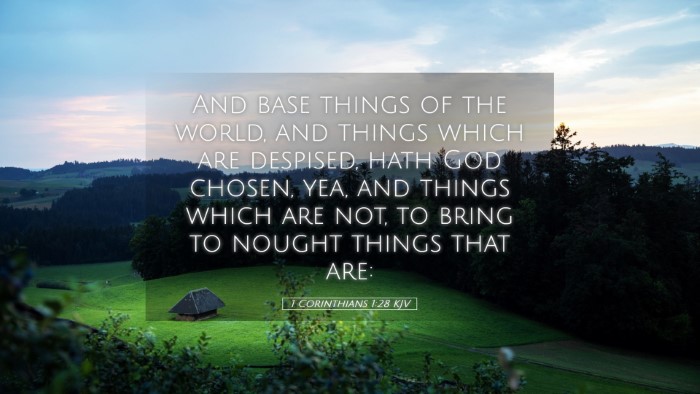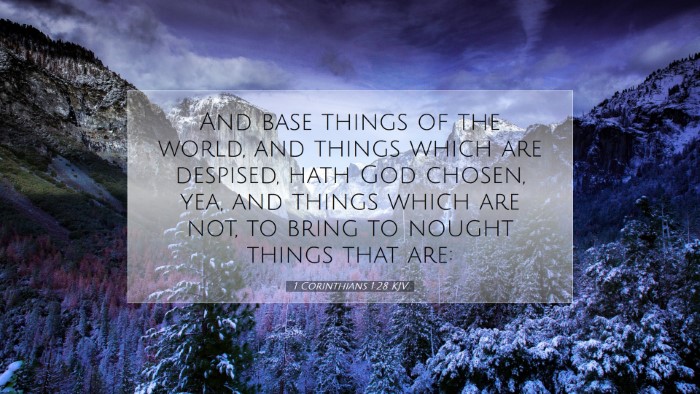Commentary on 1 Corinthians 1:28
Bible Verse: "And base things of the world, and things which are despised, hath God chosen, yea, and things which are not, to bring to nought things that are." (1 Corinthians 1:28)
Contextual Overview
This verse is part of a larger argument presented by the Apostle Paul in his letter to the Corinthians. He addresses divisions within the church and highlights God's choice in selecting the seemingly insignificant and despised to fulfill His divine purposes. The Corinthian church, rich in human wisdom and social status, needed to be reminded of God's economy of grace, wherein His power is manifested through those whom the world disregards.
Insights from Albert Barnes
Barnes emphasizes the profound nature of God's wisdom in this verse. He notes that God deliberately chooses "base things" and "despised" elements to accomplish His will. This choice serves to highlight the futility of human pride and the superiority of divine wisdom. The "base things" are not merely the lowly but include those whom society overlooks, asserting that God's selection showcases His ability to work through what seems weak or insignificant.
Insights from Matthew Henry
Matthew Henry elaborates on the implications of God choosing "things which are not." He interprets this as God's ability to bring into being that which has no value or existence in human terms. Henry further states that God’s choices display His power to confound the wise and strong of this world, demonstrating that human wisdom cannot comprehend or control God’s methods. He encourages believers to find comfort in their insignificance, trusting that God has a purpose for them despite societal norms.
Insights from Adam Clarke
Clarke provides additional depth, explaining that the "things that are not" refers to those who are not esteemed or recognized by society. He suggests that this selection is intentional, designed to reveal the emptiness of worldly glory. Clarke stresses that the early church, often composed of the poor and unlearned, illustrates God's plan to elevate the humble and destitute, thereby enriching His community through grace rather than human accolade. This approach inspires theological reflection on the nature of true greatness as defined by God's standards.
Theological Implications
The theological implications of this verse are significant for understanding God's sovereign choices. God’s election of the "base" and the "despised" is a recurring theme throughout scripture, reinforcing the idea that His ways are higher than human ways (Isaiah 55:8-9). This invites deep reflection on the humility required for believers, encouraging the church to seek value not in worldly achievements but in faithfulness to God’s calling.
Practical Applications for the Church
- Embracing Humility: Churches are called to cultivate environments where the humblest individuals are valued and heard, reflecting God's heart.
- Valuing Diversity: The body of Christ encompasses a variety of backgrounds and social standings, and this diversity should be celebrated as a manifestation of God's grace.
- Redefining Success: Believers should redefine success not by societal metrics but through faithfulness, service, and obedience to God’s call.
Conclusion
1 Corinthians 1:28 serves as a potent reminder of God's strange but beautiful economy of grace. Through the voices of Henry, Barnes, and Clarke, we gain a deeper appreciation of how God utilizes what the world deems worthless to accomplish His divine purposes. In a world that often values status and achievement, this verse challenges all leaders, theologians, and scholars to reflect on the true source of power: God's sovereign choice and grace. May the church embody these truths, serving as a beacon of hope to the marginalized and overlooked.


